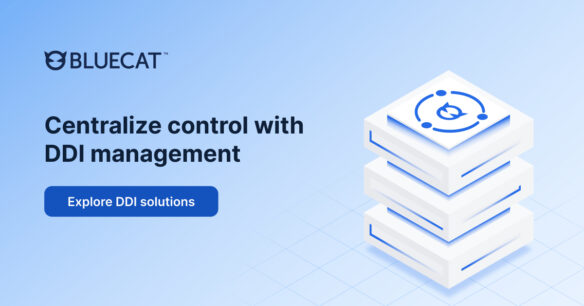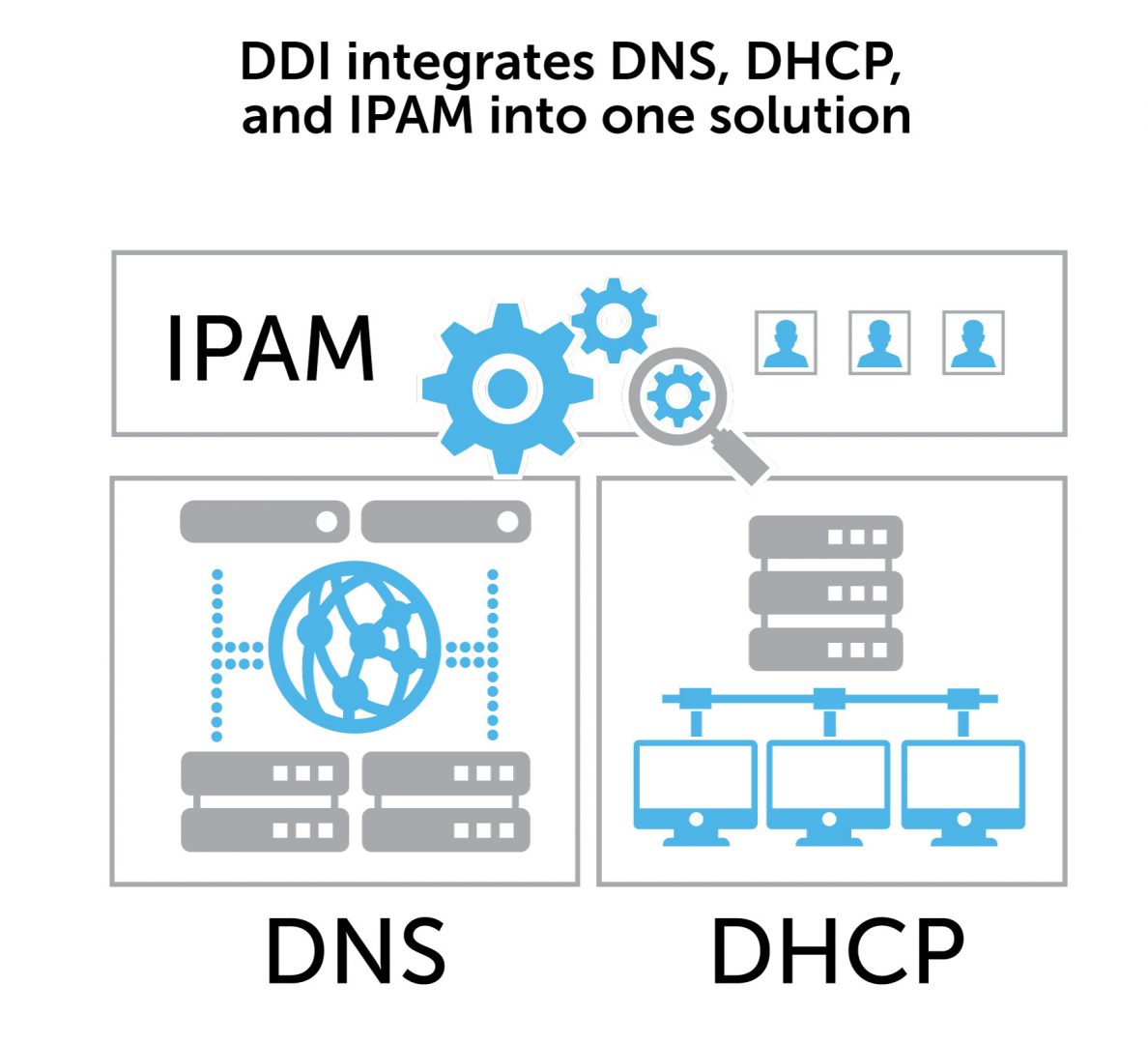- Glossary
- What is DDI? A solution for managing your network
What is DDI? A solution for managing your network
DDI stands for DNS, DHCP, and IP address management (IPAM) and describes the integration of these core networking components into one management solution.
Last updated: October 31, 2024

The very short answer to “What is DDI?” is that it stands for DNS, DHCP, and IP address management (IPAM). It is often used as a shorthand acronym to describe the integration of these three core components of networking into one management solution.
A DDI solution provides a centralized platform to manage DNS and DHCP services and has an IPAM component.
In this post, we’ll look at the three components that comprise the DDI meaning. Furthermore, we’ll explore both the core benefits and some additional features of more robust DDI network solutions.

What is DDI? The details
In order to define DDI, we must understand each leg of the triad that comprises it. In brief, DNS provides IP addresses, DHCP assigns IP addresses, and IPAM manages IP resources. Bringing these core DNS, DHCP, and IP address services together into one platform solution can transform network management.
Gartner first coined the DDI term to describe this enterprise solution. (Unfortunately, the world is still waiting for a DDI Magic Quadrant from Gartner.)
DNS
Domain Name System (DNS) is the phone book of the internet. It translates human-readable domain names that we easily remember, like bluecatnetworks.com, into IP addresses like 104.239.197.100, which are the language of the internet.
DNS allows computers, servers, and other networked devices, each with their unique IP addresses, to talk to each other. As a result, it gets users to the website they’re looking for. This semantic layer allows the internet to work more smoothly than something based only on numeric addresses.
DHCP
Dynamic Host Configuration Protocol (DHCP) is the standard mechanism to dynamically assign IP addresses within a network. When a device such as a laptop or a smartphone joins a network, it typically asks for an IP address from a DHCP server.
Next, the server will quickly and automatically assign an IP address and some related parameters. Subsequently, once the device has accepted the assignment, it can communicate with both the internal network and the public internet.
IPAM
IP address management (IPAM) is a method for planning, tracking, and managing IP address space on a network. If there are hundreds or thousands of connected devices on your enterprise network, imagine trying to keep track of each of their IP addresses yourself. It gets out of hand fast.
On the other hand, IPAM software tools can give network admins a real-time inventory of both used and unassigned IP addresses, including details like their subnets, status, hostname, and associated hardware.
On a lighter note, this isn’t the only thing that DDI stands for. Therefore, be sure you’re looking for the right definition. Our favorite might be the Bocas Islands between Trinidad and Venezuela, in the Bocas del Dragón. Locally, Trinidadians refer to them as “down de islands,” or… DDI.
Core benefits of DDI

When DNS, DHCP, and IPAM are managed separately, there are inherent risks. However, with a centralized solution, network administrators get visibility and control of their network from a single pane of glass. Specifically, this gives administrators:
- The ability to automate maintenance tasks
- Better visibility into potential conflicts when updating data for one service or another
- More context for auditing and reporting
- Enhanced efficiency
- Improved security, resiliency, and support
Since this solution is integrated, many tasks are simplified for the network team. Instead of having a gap between records and actual IP address usage, records are updated in real-time. For example, here is some of what you can do seamlessly:
- Add, delete, and update host records. IP address assignments are updated automatically.
- Selectively deploy network devices.
- Add, delete, and update IP address records. DNS records can be added, deleted, or updated automatically.
- Add, delete, or update DHCP ranges with confidence that a static device isn’t already present in the range.
Added features of DDI solutions
Additionally, beyond maintenance tasks, DDI solutions include features that help organizations take core network services management to the next level. For instance, these can include:
- A real-time, single-pane view of the network and your DDI data
- Full integration of DNS and DHCP services with your IPAM solution tool
- An open architecture offering scalability and DNS high availability
- Management of IP addresses in a user-friendly interface
- Network automation
- Compatibility with both virtual and physical appliances
- Support for the transition to IPv6 DNS
- Flexible deployment and management of hybrid cloud resources
- Security for critical services
The BlueCat platform goes even further than mere DDI to take the grunt work out of infrastructure management. For large enterprises, Integrity is the platform for integrated DNS, DHCP, and IP address management. Micetro offers enterprises a software-based overlay solution that provides DDI orchestration to unify, visualize and automate core services. Consequently, networking teams can focus on higher-level initiatives. With the BlueCat platform, DDI control, management, and visibility are at your fingertips.
Related content

Cloud DNS: Taming complexity in hybrid cloud
Public clouds handle their own DDI. But problems arise when applications have to access data or services through the native DDI of multiple environments.

eBook: Network Rising
The gap between what the network team can deliver and what end-users need continues to widen. You need back-end DNS that supports all of your initiatives.

How to gauge the value of DDI plugins
The ideal DDI solution uses automation to manage data, and every DDI vendor has a laundry list of plug-ins. But not all plug-ins are created equal.

eBook: Don’t Rely on Mr. DNS
You know who they are. They’re the go-to person for everything DNS-related. While that’s a big burden to carry, relying on a single person also puts the…